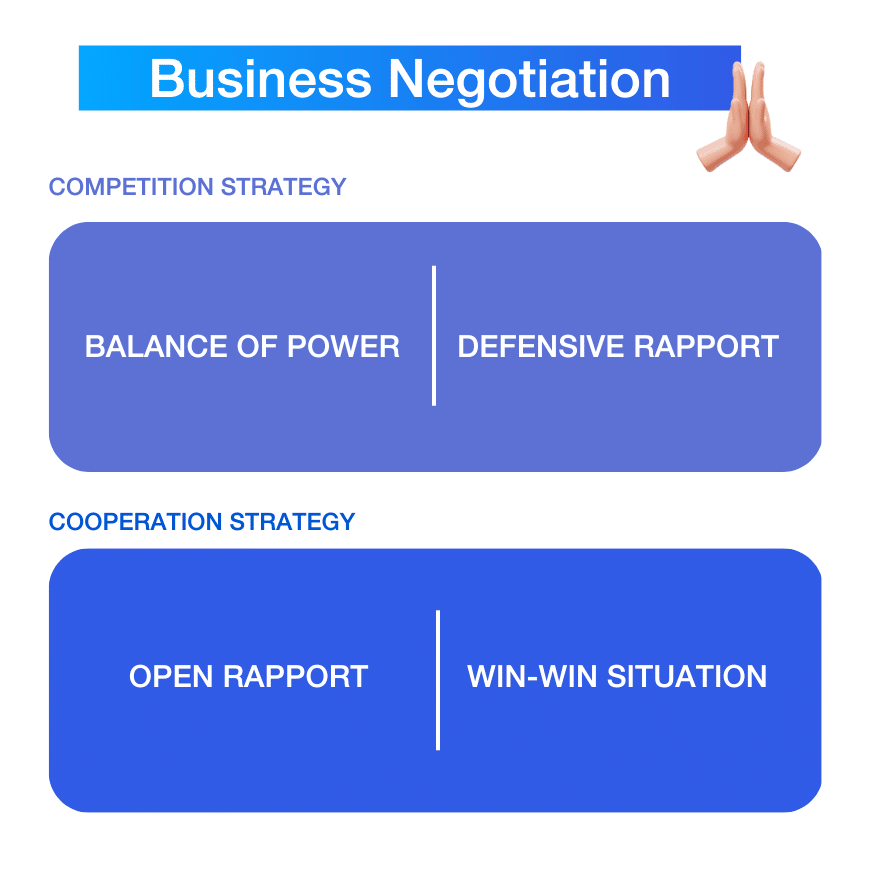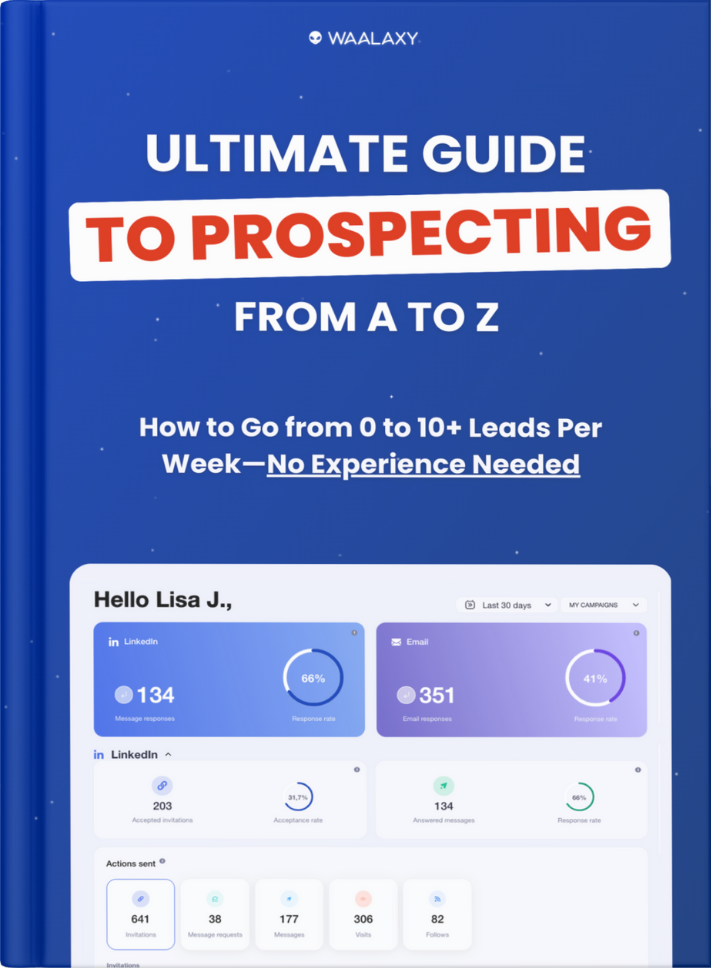What is business negotiation? How do you prepare for negotiation and B2b prospecting ? Do you want to negotiate successfully and build good relationships with your potential clients ? Then check out our comprehensive guide . ✨
Business Negotiation: Simple Definition
The business negotiation is a communication process aimed at reaching a business agreement . 🤝 The expectations, interests, positions and perspectives of the negotiators are exposed in this exchange. There are two types of business negotiations :
- Negotiating in short sales cycles : The offers commercial are simple and allows to conclude of sales from the first contact.
- Negotiating in long sales cycles : This offer is intended for large customers (executives and companies) . Several meetings with different interlocutors are necessary to find a win-win agreement. The negotiation steps can be long and sometimes include calls for tender . 📞

Business Negotiation Example: What are 3 Possible Strategies?
The art of the negotiation commercial is of course based on the preparation of the argument and active listening, but it is also based on the unspoken words and the emotions felt during the exchange : ask questions and do not act in haste. 🙏
If you want to become a great negotiator, check out these 3 sales negotiation strategies you can apply to your own sales process: ⏬
Strategy 1: Based on Power Relationships
This negotiation strategy is based on the power relationship and the relationship with the prospect . It is important to know the balance of power between the different parties involved , in order to position yourself well in the negotiations, and define the strategy to follow . Who has the most power over the others? Who will benefit the most from these negotiations ? 🤔
Depending on the negotiation strategy chosen by the company, it is natural that it takes into account the strategy of the other party to adapt to it . Taking reality and opportunity into account motivates the negotiation strategies adopted. In all cases, it is desirable that companies pursue strategies collaborative strategies in order to build trusting, quality and sustainable relationships ! ⏳
Strategy 2: Based on Cooperation, Sales and Negotiation Skills
These 2 strategies of cooperation consist in fostering complementarity and positive relationships between stakeholders. They strengthen long-term links :
- Open Rapport:
Openness strategies , classified as cooperative strategies , are negotiation options given by superiors in relationships of power relationships. When faced with subordinates ‘ demands , openness means that management will make a concession in order to make the negotiation more valuable . In this way, even if the negotiations go badly, the seller will not feel disappointed .
- Win-win Situation:
Strategy 3: Competition-Based
Competition-based negotiation strategies , 😐 significantly affect the quality of trust and relationships between market players , even if sales are successful .
- Balance of Power:
A power-relationship strategy involves demanding the performance of a task or service without regard to the interests of the other party. It is used by the party in a position of strength without concessions .
- Defensive Rapport:
Defensive strategies can be used when both parties involved in the negotiation are of equal strength . By being defensive, one party defends its position with the fewest concessions possible to the other .
In addition, let’s go over the steps of negotiation in more detail! 👇

The 7 Steps of Business Negotiation
1. Making the First Move
Boom, 💥 it ‘s time to meet the prospect! But, how do you go about it? First of all, a good reflex is to go through your database of prospecting database in advance to find out who your prospects are and build business relationships. Contact is not only about introducing yourself personally, but also about expressing your interest in selling and demonstrating your expertise . Remember that first impressions are very important in the professional world . 👀
2. Prospect’s Needs
Taking an interest in your future customers and their real needs is essential to making the right commercial offer. 🤩 Ask yourself what their needs, desires and potential barriers to purchase are . Finally , ask yourself what makes your product better than your competitors. The goal of this phase is to find the triggers to the buying decision . Use the 5W2H method , depending on your case, to fully understand the buying motivations of your prospects .
3. Sales Negotiation Pitch
First, you need to create customer portraits or “personas” and associate them with potential customers . Then, it ‘s time to create your sales pitch . If it’ s been a while since you ‘ve seen your prospect , give them a refresher on your sales pitch. 🐝 After that, present the offer holistically and get into the technical details to propose a relevant solution . Have your potential client validate your offer , regularly asking them if everything is clear and if it suits them . Don’t hesitate to invite them to ask questions.
4. Define the Objectives
During the questioning phase , you should listen to actively your customers, restate objections and provide the most appropriate answers . 🤓
5. Negotiation Phase
Offer a base price and use selling techniques to protect that price. The goal is to avoid concessions . To do this , think about the arguments in advance so that you are not at a loss when you meet with the prospect . If you have to negotiate and make concessions, try to find a mutually beneficial agreement .
6. Closing the Sale
Congratulations! You’ve closed your sale, so take a break. 👏
7. Customer Retention
Prospects, who are happy with your product or service, are more likely to recommend them to others around them. 😏 So don’t forget to network to keep in touch and loyalty your customers.
Bonus: Tips on How to Negotiate a Sale Better!
Finally, here are some tips for negotiating well: 🔥
- Don ‘t think of negotiations as battles,
- Distinguish the objections from requests for information,
- Anticipate the objections from the prospects,
- Knowing the final goal of your prospect,
- Know the buying process of your prospect,
- Avoid the manipulative negotiation tactics,
- Read between the lines,
- Knowing when to give up.

What are the 3 Techniques of Business Negotiation?
To do this, it is important to ask yourself the right questions and to build an effective sales pitch:
- What are the terms of the negotiation? The price ? The deadline ?
- What are the main features of your product or service ?
- What compensation can be claimed during of this negotiation ?
- What concessions can be made?
As explained before, a good preparation beforehand is necessary to succeed in the negotiation. 💪
Technique 1 : Be Well Prepared for the Negotiations
Just like an athlete preparing for a marathon, you need to be well-prepared for the race, as in the final stage of a sale : the sales negotiation . 🏃 Indeed, negotiations are successful when you are well-prepared in advance.
- Analyze your strengths and weaknesses:
– You must first distinguish: The strengths and weaknesses of the “opponent”.
-Your own strengths and weaknesses.
– Your potential allies .
– The values you can trust .
👉 When writing a business proposal , gather as much information about your situation as possible . Most importantly , if the conversation doesn ‘t go as planned, make sure you adapt to the situation.
- Identify the issues in the negotiation:
Depending on the industry you work in , the specific negotiation topics are always more or less the same : price, deadlines, quality, quantity (products, stakeholders, etc.) ✍️ To best meet the expectations of customers, you need to be able to prioritize them upstream. Identify the stakes of the negotiation, evaluate and foresee the consequences of a possible failure.
But don ‘t forget the relational in your negotiations. It is not visible and can be a destructive element . Therefore , it should not be ignored. 😬 It can be internal policies , good practices and values, emotions, etc .
👉 If possible , try to focus on specific issues that you have a little more control over .
Technique 2 : Define Your Goals in Advance
- Set attainable goals:
Before the meeting, set different levels of goals, from least feasible to most attainable . 🎯 Regardless of how you rank these goals, by the end of the meeting , you ‘ll be glad you achieved at least one of your goals. It helps keep your spirits up and therefore your sanity, too! It ‘s one of the indispensable pillars of selling and gives you the confidence to be able to follow up with the prospect later.
- Prepare your closing:
When you feel the tension and doubts are gone, it ‘s time to close the negotiation. ⚡ Closing can happen quickly, if the prospect has accepted your offer . Either the client happily signs , or you revise your goals and walk away with your “winnings. ” Always have a customizable contract template ready to be filled out and signed by your prospects on the spot. The less time they have to get back to it, the more likely they will sign it quickly !
Technique 3 : Always Listen to Your Prospects
- Let him talk :
Any salesperson will tell you : The art of active listening is one of the most important negotiation techniques . 👂 By letting your counterpart talk , you can discover his needs, expectations, strengths and weaknesses . Also give him the opportunity to tell his story and trust you.
Prepare a number of questions in advance , always keeping in mind the following guide: “past, present and future” . Who has he/she worked with so far ? What is he/she looking for now ? What results does he/she want in the next few years ? 👉 Above all , let him/her express him/herself and don ‘t cut him/her off . Also try to understand what is behind his request.
- Ask him the right questions:
One of the techniques of negotiation, is to evaluate the ” best response solution ” before negotiating . Also , knowing the one of your counterpart will give you a real negotiation advantage. 😉 How far can he/she go to accept the offer ? To do this , you need to ask yourself the right questions and discover information about your lead’s expectations .
This shows the limits of possible match areas , but other information is also important . For example , the more you know about your lead’s issues, goals , and past situations , the more likely you ‘ll be able to negotiate a solution ! 💫
- Imagine the future of this collaboration:
A good negotiation should give both parties a satisfying sense of agreement. 🤗 Everyone wants to have a win-win solu tion , with both parties satisfied with the outcome of the negotiations. This method of negotiation is important for building lasting relationships with clients . As a business partner, you can look to the future with confidence and build customer loyalty . If they are satisfied with the agreement reached, they will successfully start a relationship with you.

Conclusion of Business Negotiation: Where to Get Sales Negotiation Training?
To conclude, a successful business negotiation cannot be improvised … 🤫
You have to know how to anticipate buyers ‘ behavior , master sales and negotiation techniques , and know how to behave in a negotiation situation.
However, if you feel that you are not yet ready to handle a negotiation, do not panic ! There are several online or face-to-face courses to learn how to negotiate well.
On LinkedIn Learning, you will find many trainings for professionals, which teach all the negotiation techniques from A to Z : such as creating your buyer persona , role playing, calculating the sales margin, sales techniques, etc .
👉 Here is a recap of the negotiation steps we saw together in this article:
- Preparation of business commercial,
- Enter in contact with the customers,
- Understand and analyze the needs of prospect s,
- Define the objectives of the negotiation,
- Pricing and negotiating the offer,
- Conclude the deal and take a break,
- Building customer loyalty.
How to Conduct a Business Negotiation?
Now that you know the negotiation process of a good negotiation, 💥 let’s take a look at the keys to closing a sales negotiation and winning new customers:
- Highlight your offer. Don’t offer a low price right off the bat. Start with a higher offer and give yourself plenty of margin. This negotiation strategy allows you to anticipate discounts and protect your sales margins .
- Don’ t make too many concessions, especially if you don’ t have a counterparty. Ideally , rebut objections and negotiate so that you don’t have to make concessions .
- Think always possible objections before an interview.
- Control the negotiation. Structuring your speech well is just as important as listening and responding actively . Be aware of any doubts or resistance your interviewer may have.
FAQ of Business Negotiation
How to Negotiate Well During the Sales Phase?
If you are faced with objections, you should start by repeating in summary form the needs the prospect has just stated . It ‘s important to repeat contradictions to make sure you understand. 🧐
By rephrasing , the salesperson shows the buyer that they understand and care about objections. Prospects will appreciate this consideration, become less defensive, and conversations will quickly become less tense . 😅 This way , they can feel comfortable continuing the interaction and going deeper into specific topics .
Be careful , however, to look for the real reasons for the objection rather than revealing all the arguments up front . Salespeople should try to understand, not be right. This step should be considered an exploratory phase. 🔍
This creates open and honest conversations where sellers and buyers try to find solutions to their problems together . 💯 This is an opportunity to let the prospect know that their objections are valid and that other people are experiencing the same problems as them, but have been able to overcome them with the offered product .
What are the Types of Business Negotiation? Download PDF Here!
👉 Although there are no infallible techniques of negotiation , there are two types of opportunities to negotiate :
- Negotiations with short sales cycles : In one or two conversations. In the end , the seller and the customer negotiate the terms of the contract and reach an agreement .
- Negotiations with long sales cycles these: Are typically large partnership projects . They take place in multiple meetings with different interlocutors. The mobilization of teams and managers is necessary .
If you want to save this information about business negotiation, then download the PDF below! ⏬
[maxbutton id=”78″ url=”https://blog.waalaxy.com/wp-content/uploads/2023/02/Business-Negotiation_-7-Tips-for-Success.pdf” text=”Download PDF 🔥” ]









